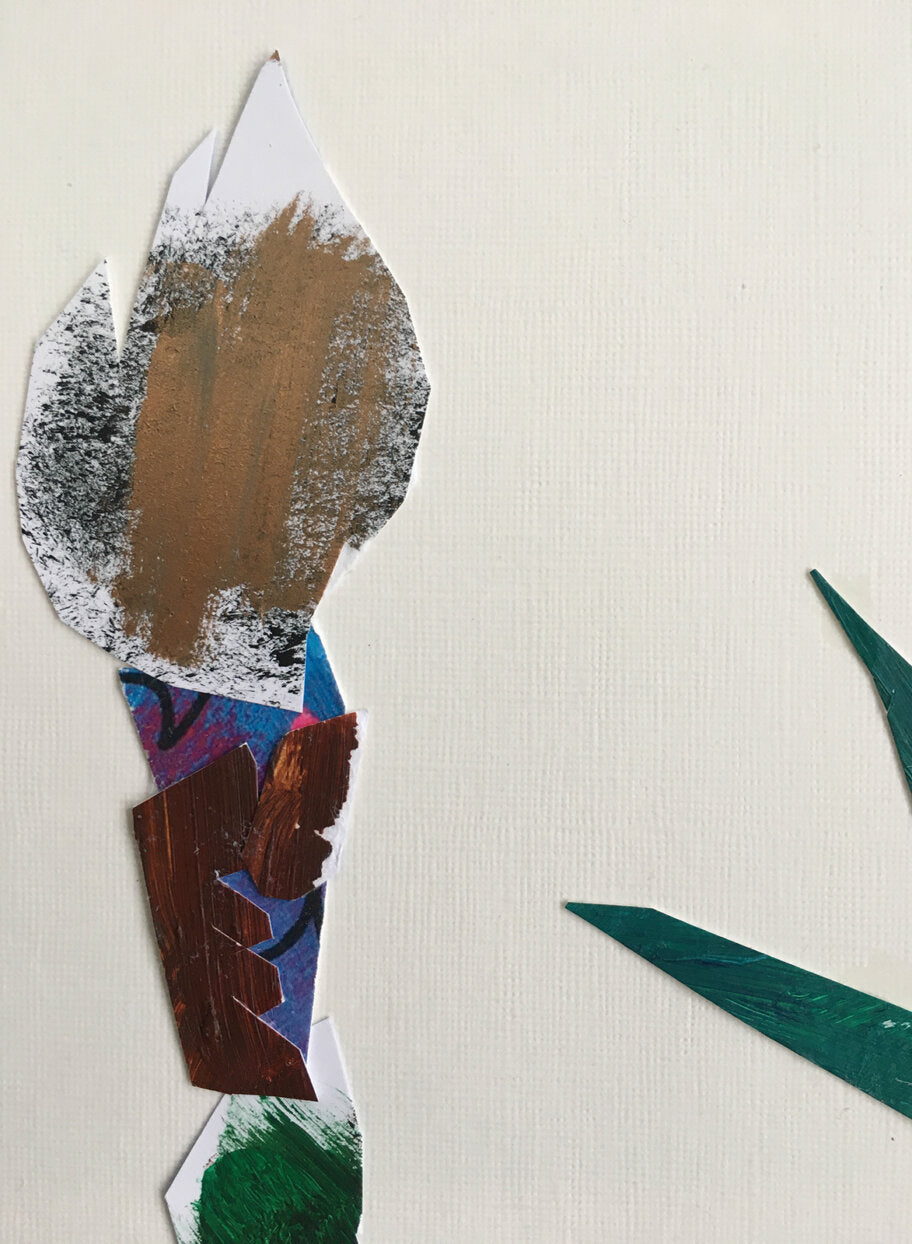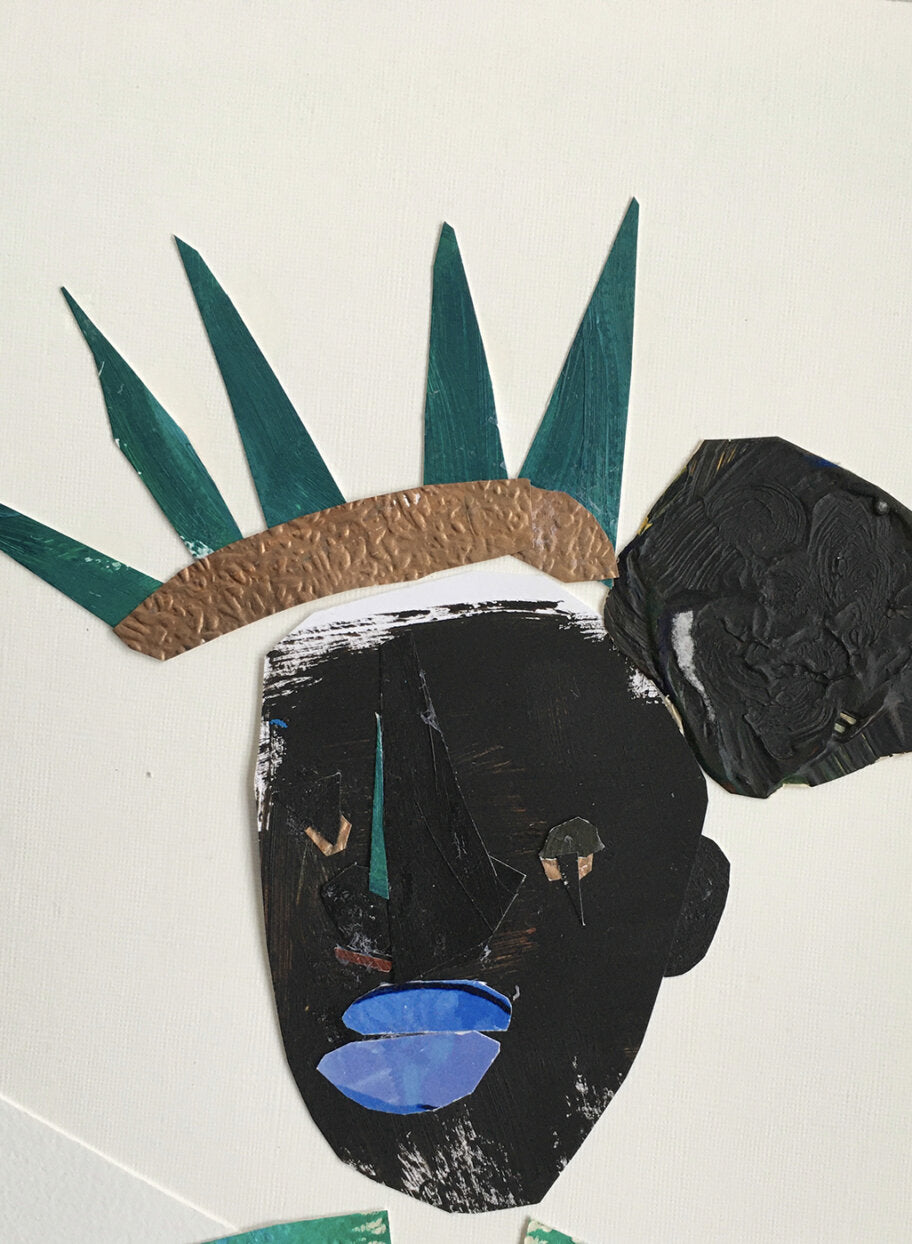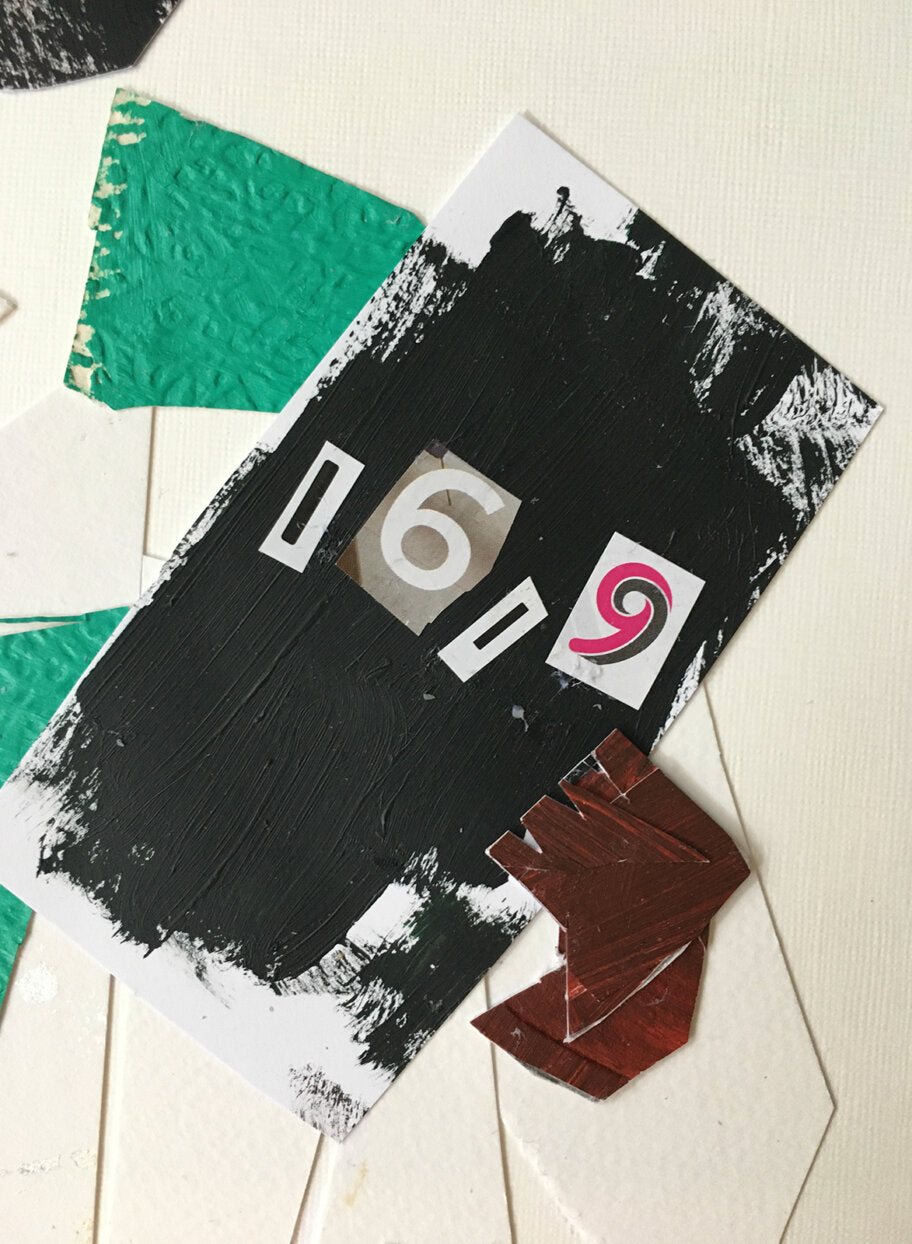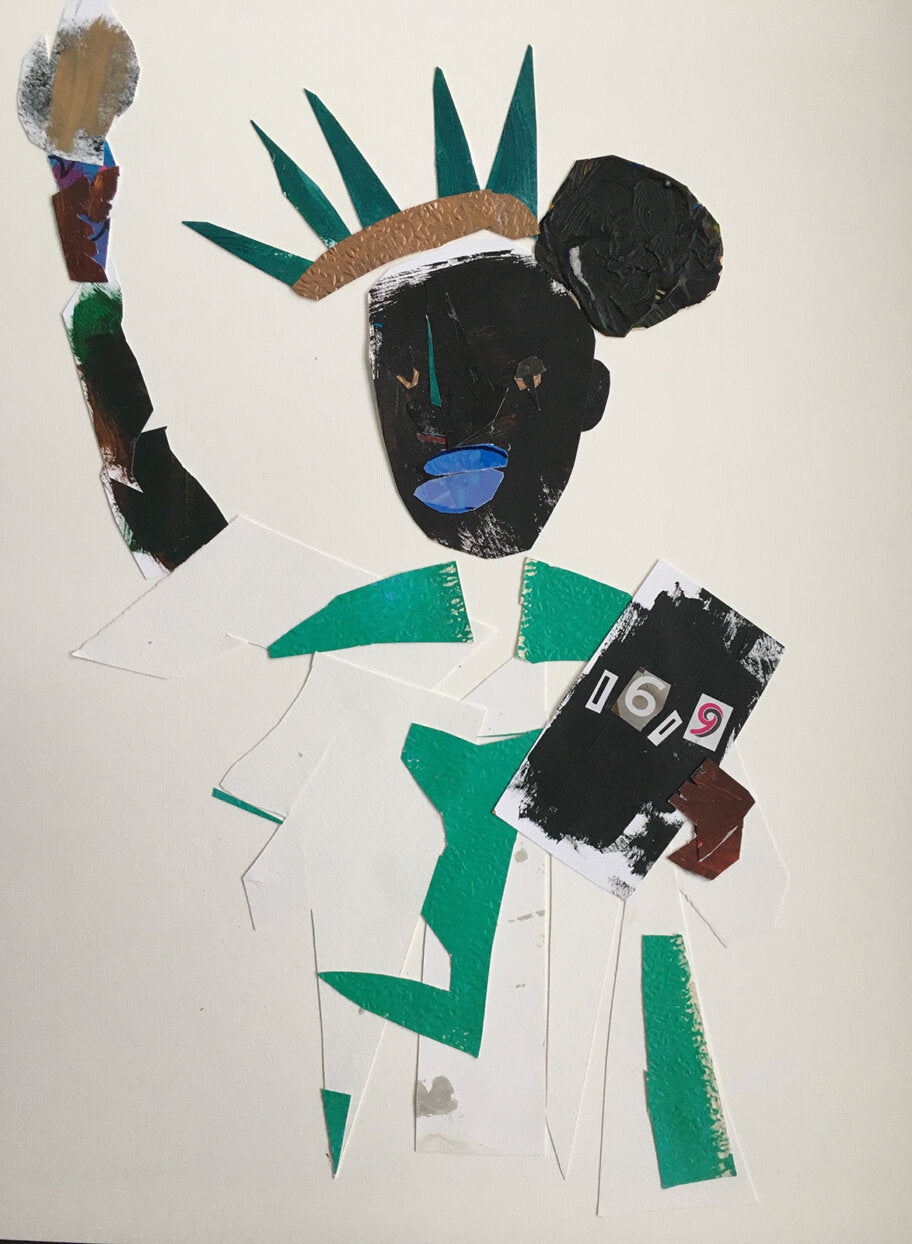
Liberty's Blues
Juneteenth we stand
Understanding the history of Juneteenth isn’t complicated, its just not taught. While most curriculums teach about slavery in America, that time is made to seem like it ended all at once, thanks to the simple stroke of a pen. A signature and a proclamation, and poof, slavery was over. But that’s just not the case. Black slaves fought for freedom long after any document was signed. For the right to be equal. Black Americans still fight now.
ARTWORK ADOLPHUS WASHINGTON @negrophonic
TEXT KASHA LASSIEN @kashalassien EKOM @e.kommm
From the artist: To me, Lady Liberty in New York harbor will always be a Black American woman – a descendant of American slavery. Her lips will always be blue, not because she sings like Lady Day, but because she speaks the blues beyond the idiom. She nurtured America, like no other woman or man. Her price for citizenship was paid in blood, and everyone, in America and around the world, has found freedom through the expression that she herself has been denied. She is Liberty’s Blues.
With the month of June rolling in, you can feel the energy shifting and smell the scent of pride in the air. The red, black, and green flag waves a little higher, ushering in Juneteenth and all of her festivities. What’s the big to do about Juneteenth you ask? June 19th, coined “Juneteenth”, is a celebratory time lifting up the true Independence Day for Black Americans as it marked the end of slavery.
For centuries, Black people have been fighting for freedom and basic rights. The hard truth is that when the Declaration of Independence was signed on July 4, 1776, black people were still slaves and were not allowed to enjoy freedom under this law. It wasn’t until almost a century later, and after a civil war, that black people gained freedom on June 19, 1865. During this time, there are said to have been over 200 different rebellions, stretching from all corners of the world. One of the most notable and successful, The Haitian Revolution of 1791, inspired revolutions in the years following such as the German Coast Uprising of 1811 and Nat Turner’s Rebellion in Southampton County, Virginia.

Liberty's Blues
“What, to the American slave, is your 4th of July? I answer: a day that reveals to him, more than any other days in the year, the gross injustice and cruelty to which he is a constant victim.” – Fredrick Douglas
Two hundred and ten years ago, on January 8, 1811, the largest slave rebellion in U.S. history was led by a slave driver known as Charles Deslondes. Inspired by the success of the Haitian Revolution, he led a band of slaves into the home of plantation owner Manuel Andry where they overpowered the family and took up arms with a plan to join other revolutionaries in New Orleans. They made their way along the Mississippi River, burning down other plantations, and growing in numbers of up to roughly 200 to 500 enslaved people. Their goal was to eventually establish a black state along the Mississippi, but that was soon squashed by relentless federal troops and the slave owners’ militia. Forced to retreat, then blocked from retreating, the revolt was brutally cut down and the surviving leaders, including Deslondes, were barbariously executed and put on display as a message to other slaves. For years, the victors spun tales meant to undermine the near success of the revolt, unwilling to admit to the defeat they nearly encountered.
Since the victors create the narrative, the story they would like you to believe is that black people lived in slavery, willingly and docile, and rarely fought for independence, but this couldn’t be further from the truth as we see with the next rebellion led by Nat Turner. Nat Turner was a spiritual and intelligent man. He was a leader and was made the ”preacher” of the plantation where he was enslaved. Nat Turner and approximately 50 additional enslaved peoples decided to take their freedom by force on August 21, 1831. The following day, they were met with a militia that sought to stop the rebellion. Some of Turner’s group were captured while others escaped, including Nat, who went into hiding. On October 30, 1831, Nat Turner was apprehended. The following month, he was beaten, tortured, and skinned alive in his fight for his freedom. The effects of this rebellion echoed throughout several states as more oppressive laws were created prohibiting enslaved peoples the right to learn, read, or write, and more restrictive measures were placed on their movement. And still, they continued the fight as many more rebellions were recorded after, even in the face of death and shaped American history and the world as we know it.

Liberty's Blues
“Black Americans have always been loyal when the ideals of American democracy have been attacked. We have given our blood in its defense — from Crispus Attucks on Boston Commons to the battlefields of France.
We have fought for the democratic principles of equality under the law, equality of opportunity, equality at the ballot box, for the guarantees of life, liberty and the pursuit of happiness … Yes, we have fought for America with all her imperfections, not so much for what she is, but for what we know she can be.”
– Mary Mcleod Bethune
Although the Emancipation Proclamation was signed in 1863, it didn’t actually free all enslaved people, especially those in slaveholding border states, it only declared freedom to slaves living in states not under Union control. It wasn’t until 1865 in Galveston, Texas that the last enslaved Black people in America learned that they were free as the southern rebellion collapsed. Slavery– as it had been operating-was abolished. Word spread and free men across the nation began to celebrate with a host of activities to lift up their Black pride. Today, we recognize and continue this tradition in celebration of the strength of our ancestors and our freedom.
This annual celebration is known by many names such as Jubilee Day, Freedom Day, African American Independence Day, and more commonly, Juneteenth. As of June 16, 2021, Juneteenth is now considered a Federal holiday! The day is commemorated with family and community gatherings, where song and dance flow through our bodies and streets, stories and family history recount events to remind us of who we are and where we come from. Plates are piled high with traditional food off the grill, and red hued sweets and drinks like red velvet cake and punch sweeten the day. In parts of the south, you can even witness Black Cowboys and girls trotting up and down the streets on the backs of their horses.
With love, appreciation, and freedom thick in the air, we gather with one another to enjoy the gifts our ancestors have bestowed upon us. We know that once the former system of slavery was abolished, a new system took its place in the form of Jim Crow and institutionalized, systemic racism. Therefore, we celebrate our liberation and those who fought in the past, those who fight in the present, and those who will join the fight to come. The fight continues.

Liberty's Blues
“It behooves us to stay here and to fight. We have made this land, even though we have not been given the recognition, and nobody has to create any little nation or any little group and send us scuttling off. We want to go, we go. Freedom of choice.
The black man’s total commitment to America indicates that the prospect ahead does seem bright. It is true that we are angry about our present plight, for we measure this country not by her achievements but by her potential.”
– Shirley Chisholm
@NEGROPHONIC
